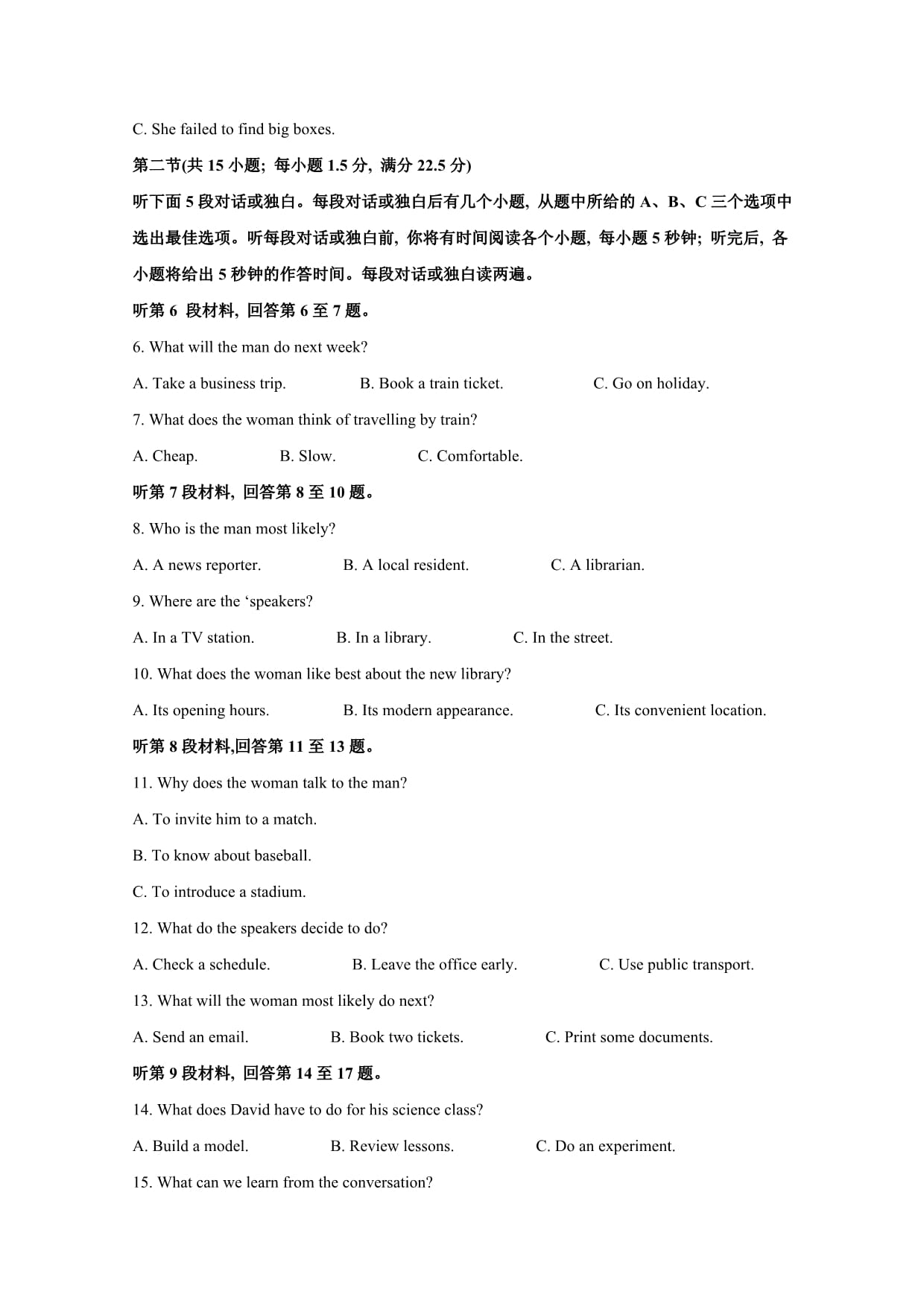




版權(quán)說(shuō)明:本文檔由用戶提供并上傳,收益歸屬內(nèi)容提供方,若內(nèi)容存在侵權(quán),請(qǐng)進(jìn)行舉報(bào)或認(rèn)領(lǐng)
文檔簡(jiǎn)介
河南省開(kāi)封市2024-2025學(xué)年高一上學(xué)期期末英語(yǔ)學(xué)情檢測(cè)試題本試卷分第I卷(選擇題)和第II卷(非選擇題)兩部分。共150分,考試時(shí)間120分鐘。注意事項(xiàng):1.答卷前,考生務(wù)必將自己的姓名、準(zhǔn)考證號(hào)填寫在答題卡上,并將自己的準(zhǔn)考證號(hào)、座位號(hào)填寫在本試卷上。2.回答選擇題時(shí),選出每小題答案后,用2B-鉛筆把答題卡上對(duì)應(yīng)題目的答案標(biāo)號(hào)涂黑;如需改動(dòng),用橡皮擦干凈后,再涂選其他答案標(biāo)號(hào),涂寫在本試卷上無(wú)效。3.作答非選擇題時(shí),請(qǐng)用直徑0.5毫米的黑色墨水簽字筆在答題卡上各題的答題區(qū)域內(nèi)作答,超出答題區(qū)域書(shū)寫的答案無(wú)效,在試題卷、草稿紙上作答無(wú)效。第I卷(選擇題,共95分)第一部分聽(tīng)力(共兩節(jié),滿分30分)做題時(shí),先將答案標(biāo)在試卷上。錄音內(nèi)容結(jié)束后;你將有兩分鐘的時(shí)間將試卷上的答案轉(zhuǎn)涂到答題卡上。第一節(jié)(共5小題;每小題1.5分,滿分7.5分)聽(tīng)下面5段對(duì)話。每段對(duì)話后有一個(gè)小題,從題中所給的A、B、C三個(gè)選項(xiàng)中選出最佳選項(xiàng)。聽(tīng)完每段對(duì)話后,你都有10秒鐘的時(shí)間來(lái)回答有關(guān)小題和閱讀下一小題。每段對(duì)話僅讀一遍。1.Whatwillthespeakersdonext?A.Startworking.B.Goandhavelunch.C.Discusstheproject.2.Howistheweathernow?A.Cloudy.B.Rainy.C.Sunny.3.Whatdoesthewomansuggestthemando?A.Giveaperformance.B.Dresssmartly.C.Gotothetheatre.4.WhatisSally’snewinterest?A.Music.B.Dolls.C.Boxing.5.Whatisthewoman’sproblem?A.Shecan’tcarrytheboxesupstairs.BShebrokeherarmyesterday.C.Shefailedtofindbigboxes.第二節(jié)(共15小題;每小題1.5分,滿分22.5分)聽(tīng)下面5段對(duì)話或獨(dú)白。每段對(duì)話或獨(dú)白后有幾個(gè)小題,從題中所給的A、B、C三個(gè)選項(xiàng)中選出最佳選項(xiàng)。聽(tīng)每段對(duì)話或獨(dú)白前,你將有時(shí)間閱讀各個(gè)小題,每小題5秒鐘;聽(tīng)完后,各小題將給出5秒鐘的作答時(shí)間。每段對(duì)話或獨(dú)白讀兩遍。聽(tīng)第6段材料,回答第6至7題。6.Whatwillthemandonextweek?A.Takeabusinesstrip.B.Bookatrainticket.C.Goonholiday.7.Whatdoesthewomanthinkoftravellingbytrain?A.Cheap.B.Slow.C.Comfortable.聽(tīng)第7段材料,回答第8至10題。8.Whoisthemanmostlikely?A.Anewsreporter.B.Alocalresident.C.Alibrarian.9.Wherearethe‘speakers?A.InaTVstation.B.Inalibrary.C.Inthestreet.10.Whatdoesthewomanlikebestaboutthenewlibrary?A.Itsopeninghours.B.Itsmodernappearance.C.Itsconvenientlocation.聽(tīng)第8段材料,回答第11至13題。11.Whydoesthewomantalktotheman?A.Toinvitehimtoamatch.B.Toknowaboutbaseball.C.Tointroduceastadium.12.Whatdothespeakersdecidetodo?A.Checkaschedule.B.Leavetheofficeearly.C.Usepublictransport.13.Whatwillthewomanmostlikelydonext?A.Sendanemail.B.Booktwotickets.C.Printsomedocuments.聽(tīng)第9段材料,回答第14至17題。14.WhatdoesDavidhavetodoforhisscienceclass?A.Buildamodel.B.Reviewlessons.C.Doanexperiment.15.Whatcanwelearnfromtheconversation?A.Thewomanfoundsomeballsinhergarage.B.Themanofferedtogivethewomansomeballs.C.Judymadeasolarsystemmodellastmonth.16.WhoisJudyprobably?A.David’steacher.B.David’smother.C.David’sschoolmate.17.Whatistheman’sopiniononthesolarsystemproject?A.Boring.B.Interesting.C.Difficult.聽(tīng)第10段材料,回答第18至20題。18.Howlonghasthespeakerspentrecordingpeople’sfacialexpressions?A.Twoyears.B.Threeyears.C.Tenyears.19.Whatarepeople’sfacialexpressionslikeintheworld?A.Culturallydiverse.B.Verysimilar.C.Individuallydifferent.20.Whydoesthespeakerenjoytakingpicturesofchildren?A.Theyalwayswanttoplay.B.Theyexpresstheiremotionsopenly.C.Theylikehavingtheirpicturestaken.第二部分閱讀理解(共兩節(jié),滿分50分)第一節(jié)(共15小題;每小題2.5分,滿分37.5分)閱讀下列短文,從每題所給的四個(gè)選項(xiàng)(A、B、C和D)中,選出最佳選項(xiàng),并在答題卷上將該項(xiàng)涂黑。ATeenswhoarejustabouttoenterhighschoolwillfaceaproblem—whichsporttochoose.Someteenagershaveneverbeeninvolvedinorganizedsportsandlotsofstressmaycomeintoplay.Ifthissoundslikeyourteen,encouragethemtotrythesportthatmostattractsthem.HereisalistofsomeofthetopfavoredsportsbyteenagersintheUSA.Basketball:Itisthemostpopularsportwithalmosthalfamilliongirlsplayinginschoolteams.Andmorethan5.8millionboysandgirlsplaycompetitively,choosingitastheirfavoritesportandplayinginschoolteams.It’sagoodteamsport.Americanfootball:Itisnolongerthenumberonesportplayedamongteenagers,mainlybecauseoftheriseofothersports.Someparentsbelieveittobeadangeroussportbut,withtherightcoachandenvironmentaswellastheequipment,itshouldbeperfectlysafetotakepartin.Volleyball:Itisexcellentforgirlsandisagoodgametoplayinateam.Itisthefifthfavoredsportforgirlsandtheygetconfidenceinthesport.It’salsoagoodideatoinvolvethemincompetitivevolleyball.Trackandfield:ifyourteenlikesindividualsport,trackandfieldisgoodtotakepartin.Trackandfieldincludesrunning,throwingandjumping.Trackandfieldcanprovideachanceforalmostanyyouthtogetoutandcompete.1.WhichsportisthemostpopularamongteenagersintheUSA?A.Americanfootball. B.Volleyball. C.Basketball. D.Trackandfield.2.WhyisAmericanfootballnolongerthenumberonesportamongteenagers?A.Becauseitisadangeroussport.B.Becauseoftheriseofothersports.C.Becausetheequipmentisnotgood.D.Becausetherearen’trightcoachesandenvironment.3.Whatisthepurposeofthepassage?A.Toencourageteenagerstoplaysports.B.Tocomparedifferentsportsforteenagers.C.Toexplainthebenefitsofsportsforteenagers.D.Tointroducesomepopularsportstoteenagers.BThesceneinthestandsatRolandGarros’sCourtPhilippe-Chatrierwasdottedwithredbanners,addingaglowtothealreadyorangeyairspreadingtheredclaycourt.TherewerehundredsofChinesewavingflagstosupportQinwenZheng,21,whowouldsoontakegoldbydefeatingCroatia’sDonnaVekicinthewomen’ssinglestennisfinal.Asshelaydownonthedirt,eyesskywardandfistsextendedintotheParishaze,thewin’sgravityseemedtoregister:ThiswasChina’sfirst-everOlympicgoldmedalinthissport.WhentalkingabouttheOlympics,Zhengsaid,“ItreatedtheGamesdifferently—theemotion,thefight,thementality.Ifyouaskedmetostaythreemorehourstofight,Icoulddoit.”Bornin2002,Zhengstartedplayingtennisatageseven.Atageeight,shemovedaloneforbettercoaching.Sinceadolescence,shehasdeeplyadmiredChineseathletes,suchasthetennisstarLiNa,whojoinedthe2008BeijingGames,andtherunnerLiuXiang,whowongoldatthe2004AthensGames.“Itwasreallytough,”Zhengsaid,lookingbackatthoseearlydays.“Mymomusedtocomevisitonweekends.Whensheleft,Iwouldholdherlegandcry.After13,shedecidedtostaywithmefull-timetoletmehavebettergrowthandcare.Afterthat,itgoteasier.AndwemovedtoEuropewhenIwas17.”InParis,Zhengperformedexceptionallywellonherroadtogold,includingtopplingworldnumberoneIgaSwiatek.“WithIga,Iwasclear,”Zhengsaid.“IknowwhyIlosttoherbefore.Iplayed,rushed,madetoomanyunforcederrors,andwantedtohitfasterthanher.Iwantedtoprovemypower.ButintheseGames,Ididn’tthinklikethis.”Zhengisconscious,too,oftheeffectsthathermilestoneachievementinPariswillhave.Aswewrappedupourchat,shesaid,softly,“Iwasreadingcommentslastnightandsomeofthemweretalkingaboutinspiration,andthismakesmefeelproud.Ifyouwatchmytennisanditbringsyousomeextrastrengthinyourlife,thatwillmakemehappy.”4.Accordingtothepassage,whatisTRUEaboutQinwenZheng?A.ShesecuredthefirstChineseOlympictennischampionship.B.Sheconsideredalltennisgamestobeequallyimportant.C.Asateenager,shewantedtogobeyondotherChineseathletes.D.Shefeltconfidenttolivealoneatherearlydaysoftraining.5.Whatdoestheunderlinedword“toppling”inthe6thparagraphmean?A.Challenging. B.Defeating. C.Discouraging. D.Declining.6.WhichwordscanbestdescribeQinwenZheng?A.Strong-willedandreflective. B.Creativeandindependent.C.Sincereandambitious. D.Competentandidealistic.7.WhatcanweinferfromQinwenZheng’swordsinthelastparagraph?A.ShetakesprideinattainingtheOlympicgoldmedal.B.Shehopesthatherachievementwillearnherfame.C.Sheexpectsherachievementtomotivatemorepeople.D.Shefeelsdelightedtoreadnumerouscommentsonhermatch.CThinkbacktoyourfirstmemory.Howoldwereyouatthetime?Chancesareyoucan’trememberanythingearlierthankindergartenorprimaryschool—nothingaboutyourfirstwords,steps,orsolidfoodotherthanwhatyourparentshavelatertoldyou.Thisphenomenoniscalled“infantileamnesia”,duetowhichthemajorityofadultsrarelyrememberthingsthathappentothembeforetheageofthree.Sowhyisitthatwecan’trememberbeingababy?Theanswerliesinthewaythatourbrain’sabilitytostorememorieschangesaswegrow.Atbirth,ababy’sbrainisonlyaquarterofitsadultsize,growingtothree-quartersthesizeofanadultbrainbyagetwo.Thisincreaseisassociatedwithagrowthinthenumberofbraincells—calledneurons(神經(jīng)元)—andtheconnectionsbetweenthesecells.Apartofthebrainthatisparticularlyimportantinformingmemoriesisthehippocampus(海馬體),saysDrDhanishaJhaveri,aresearcheratTheUniversityofQueensland.Thisregionstoresautobiographicalmemoriesfromspecificeventsinourlives.“Inthehippocampus,newneuronsareconstantlybeingcreated.Inadulthood,newcellsarestillbeingproduced,buttherateofproductioninthehippocampusslowsdown,”saysDrJhaveri.Neuroscientistsbelievethattherapidrateatwhichbraincellsarebeingproducedinchildhoodcouldbethecauseofinfantileamnesia.Becausesomanynewneuronsarebeingproducedandformconnectionswitheachotherinmemorycircuits,theymightdisrupt(擾亂)existingnetworksofmemoriesthathavealreadyformed.Despitethismemoryloss,childhoodexperienceshavebeenfoundtoinfluenceadultbehaviouryearslater,whichsuggeststhattracesofthesememoriescouldbestoredsomewhereinthebrainthatisn’teasytoaccess.Inresearchinanimals,scientistshavefoundthatlatent(潛在的)tracesofearlyexperiencesremaininthebrainforalongtime,andcanlaterbetriggered(觸發(fā))byareminder.Ithighlightstheimportantinfluenceofearlylifeexperiencesonmentalandemotionalwell-beinglaterinlife.8Whatisinfantileamnesia?A.Theinabilitytoformmemoriesduringadulthood. B.Theinabilitytorecallearlyexperiences.C.Theinfluenceonexistingmemorynetworks. D.Theinfluenceonmentalandemotionalwell-being.9.Whatdowelearnaboutthebrainaccordingtothepassage?A.Newneuronsdisruptexistingmemorycircuits. B.Thehippocampusplaysapassiveroleinone’smemory.C.Ababy’sbrainisthree-quartersthesizeofanadultbrain. D.Braincellsarebeingproducedmorerapidlyinadulthood.10.Whatdoestheresearchinanimalsshow?A.Memoriesarestoredseparatelyintheirbrain. B.Memoriesaremainlyformedwhentheyareyoung.C.Earlyexperienceshavealong-termimpactonlife. D.Earlyexperiencesareeasytobetriggeredbyareminder.11.Whichofthefollowingisthebesttitleforthepassage?A.TheFormationofEarlyChildhoodMemoriesB.TheImpactofInfantileAmnesiaonMemoryNetworksC.TheRoleoftheHippocampusinMemoryFormationD.TheInfluenceofEarlyLifeExperiencesonMentalWell-beingDChatGPT,designedbyOpenAItocarryonconversationsjustlikehumans,hasbecomeaviralexcitement.TheAI-poweredtoolwentfromzerotoamillionusersinjustfivedays!Itsabilitytoprovidein-depthanswerstouserquestionshasevendrawntheattentionofdistinguishedtechnologycompanies.Theintelligentrobotunderstandswhattheusersaysortypesandthenrespondsinawaythatmakessense.Itsvastbodyofknowledgehasbeengatheredfromtheinternetandarchivedbooks.Itisfurthertrainedbyhumans.ThismakesChatGPTausefultoolforresearchingalmostanytopic.“Wehavealotofinformationontheinternet,butyounormallyhavetoGoogleit,thenreaditandthendosomethingwithit,”saysRicardo,chiefscienceofficerandco-founderofAIcompanyErudit.“Nowyou’llhavethisresourcethatcanprocessthewholeinternetandalloftheinformationitcontainsforyoutoansweryourquestion.”ChatGPTcannotthinkonitsown.Itdependsontheinformationthatithasbeentrainedon.Asaresult,theAItoolworkswellforthingsthathaveaccuratedataavailable.However,whenunsure,ChatGPTcangetcreativeandflowoutincorrectresponses.OpenAIcautionsuserstochecktheinformationnomatterhowlogicalitsounds.Also,ChatGPThasonlybeentrainedwithinformationtill2021.Hence,itcannotberelieduponforanythingthathappenedafterthat.ExpertsbelieveChatGPThaslimitlesspotentialtosolvereal-worldproblems.Itcantranslatelongtextsintodifferentlanguages,createcontentonalmostanytopic,andevensummarizebooks.However,ChatGPThasreceivedmixedreactionsfromeducators.Somebelieveitcouldserveasavaluabletooltohelpbuildliteracyskillsintheclassroom.Itcouldalsobeusedtoteachstudentsdifficultscienceormathconcepts.ButothereducatorsthinkChatGPTwillencouragestudentstocheat.Theyfearthiswillpreventthemfrombuildingcriticalthinkingandproblem-solvingskills.Asaresult,manydistrictsarestartingtobanitsuseinschools.12WhatistheuniquefeatureofChatGPT?A.Ithasartificialintelligence. B.Itcananswerusers’questions.C.Ithasthelargestnumberofusers. D.Itcanengageinmeaningfulconversations.13.WhatmakesChatGPThelpfultoresearchvarioustopics?A.Itscapabilityofinformationprocessing. B.Itsaccurateinformation.C.Itsavailabilityofup-to-datedata. D.Itsvastbodyofquestions.14.WhydoChatGPTusershavetobecautiouswhenusingit?A.ChatGPTisunabletothinkitself. B.ChatGPTlackscreativity.C.ChatGPToffersillogicalinformation. D.ChatGPTisnotproperlytrained.15.Whatistheauthor’sattitudetowardsChatGPT?A.Favorable. B.Disapproving. C.Objective. D.Intolerant.第二節(jié)(共5小題;每小題2.5分,滿分12.5分)閱讀下面短文,從短文后的選項(xiàng)中選出可以填入空白處的最佳選項(xiàng)。選項(xiàng)中有兩項(xiàng)為多余選項(xiàng)。WhatToDoWhenYou’reJealousOfYourBestFriends’Grades?You’vejustreceivedyourfinalgradesandthey’renotexactlywhatyouwerehopingfor.Tomakemattersworse,yourbestfriends’gradeshavegotyougreenwithenvy.Trynottopanic.We’veputtogethersometipstohelpyoumanage.Behappyforthem.Firstthingsfirst,makesureyoustartthingsoffrightbycongratulatingthemfordoingwellthissemester.We’renotgoingtolie,thiscanbehardwhenyou’refilledwithjealousy(忌妒),butyourbestfriendhasworkedforitandtheydeservetobecelebrated.Don’thatethemfortheirachievements.___16___Faceuptoyourfeelings.Insayingthat,beinghappyforyourbestfrienddoesn’tmeanyoushouldrepress(壓抑)yourfeelings.___17___Askyourselfwherethisjealousyiscomingfromandwhetheryourbestfriendgettingabettergradethanyouactuallymattersinthelongrun.Gettingtotherootofthesefeelingsisanimportantfirststeptoovercomingyourjealousy.Useitasmotivation.Feelingjealousdoesn’thavetobeabadthing.Thefactthatyou’reenviousofyourfriend’sgradesmeansyoucareaboutyourstudies.Thebestthingtodointhissituationistouseyourjealousyasmotivationtodobetterandmakeeffortstoimproveyourowngrades.Figureoutwhereyouwentwrongandlearnfromyourmistakes.Don’tfocusallyourenergyon’feelingupset.___18___Focusonwhatyoulearned,notthegradesyoureceived.___19___Ratherthanworryingaboutyourgradestrytofocusontheknowledgeandskillsyoulearnedthroughoutthesemesterandhowtheyhelpedyouimproveasaperson.___20___Thefactthatyourbestfriendreceivedahighergradethanyoudoesn’tmeanyou’reafailure.Weneedtostopusingotherpeople’ssuccessesasameasureforourownself-worth.Lifeisn’tacompetition.Focusonyourownstrengths,appreciateyourselfmore,andsoonenoughyourjealousywilljustmeltaway.A.Trynottocompareyourselftoothers.B.Trytobehonestwithhowyou’refeeling.C.Whilegradesareimportant,theyaren’teverything.D.Focusonthem,andsoonyourjealousywillmeltaway.E.Allowyourselftofeelgenuinelyhappyforyourfriend.F.Instead,trytosettingnewgoalsandcreatingbetterstudyhabits.G.However,envycanquicklybecomeaproblemforyourfriendship.第三部分語(yǔ)言知識(shí)運(yùn)用(共兩節(jié),滿分30分)第一節(jié)(共15小題;每小題1分,滿分15分)閱讀下面短文,從短文后各題所給的A、B、C和D四個(gè)選項(xiàng)中,選出可以填入空白處的最佳選項(xiàng)。ApartfromGermany,thefirstforeignlanguageIeverlearntwasFrench,butitdidn’tgoverywell.MymotheraskedourneighbourtoteachmewhenIwasseven.Frenchwasn’this___21___language,butheusedtoliveinParis,sohecouldspeakwithfluency.However,___22___hishelp,thewordsfeltstrangeonmytongue,andIcouldn’tkeepthenew___23___straightinmymind.Also,Ijustdidn’tthinkthatit___24___mydailylifeinanyway.Thus,Ieventually___25___.Duringthenewsemesterofmyseniorhighschool,my___26___towardslanguagelearningchanged.OurGermanyteacherwasMrs.Hans:atall,slim,gracefullady.I’llneverforgetthefirstclassshe___27___herselftous.Sheneveronce___28___hervoice,butthemomentshebegantospeak,theroomfellsilent.The___29___wasthatMrs.HanslovedGermanlanguageandculture—andeverybodyinherclassescouldn’thelpbutlovethelanguage,too.Weall___30___thewayshetalkedaboutGermanfoodandtraditions.AndIrealizedwhat___31___agoodteacher.Agoodteacherissomeonewhoisinlovewithwhatsheorheis___32___.Amazingly,learningGermanwasn’ta___33___formelikelearningFrench.SoonIbegantoread___34___booksinGermany.Itcertainlywasn’teasy,butIgottoreadanumberofinterestingstories.ReadingGermanclassicsopenedawindowformetoanotherworldandgavemeanewpointof___35___onmyownworld.21A.basic B.specific C.systematic D.native22.A.despite B.with C.for D.besides23.A.system B.character C.vocabulary D.dialect24.A.referredto B.ledto C.datedfrom D.rebatedto25.A.fellapart B.gaveup C.droppedout D.carriedon26.A.attitude B.appreciation C.description D.reference27.A.commented B.regarded C.stressed D.introduced28.A.lengthened B.raised C.affected D.destroyed29.A.reason B.factor C.summary D.symbol30.A.appreciated B.delivered C.suffered D.based31.A.shocks B.makes C.equals D.symbolises32.A.demanding B.teaching C.carving D.begging33.A.gap B.means C.variety D.struggle34.A.characteristic B.major C.classic D.global35.A.affair B.equality C.base D.view第Ⅱ卷(非選擇題,共55分)第二節(jié)(共10小題;每小題1.5分,滿分15分)閱讀下面短文,在空白處填入1個(gè)適當(dāng)?shù)膯卧~或括號(hào)內(nèi)單詞的正確形式。AthousandyearsagoinKaifeng,China,therewereagroupofpeoplepresentingartandbeautyperfectly.Suchartisknown___36___Bianembroidery(刺繡).Sofarit___37___(recognize)asastate-levelintangible(非物質(zhì)的)culturalheritage.Bianembroideryisconsideredas___38___uniqueformofartisticexpressionoftheSongDynasty.Thenaturalcolors___39___delicatestitches(針?lè)?maketheembroiderylooklikevivid___40___(paint).Ineachpieceofwork,embroidererswouldcombinemanyelements___41___(include)fineart,literatureandphilosophy.There-creationofthemasterpieceAlongtheRiverduringtheQingmingFestivalistheworkof___42___(experience)Bianembroiderers___43___havelongobservedtheoriginalworkandobjects.It___44___(take)over20embroiderersawholeyeartocompleteit.Themillennium-oldworkhasbeen____45____(extreme)populartilltodayandgoesbeyondthetime,bringingoutthefinetextureofpainting.第四部分寫作(共兩節(jié),滿分40分)第一節(jié)(滿分15分)46.假如你是李華,得知你的英國(guó)朋友Eric在漢語(yǔ)書(shū)法比賽中獲得一等獎(jiǎng)。請(qǐng)你給他寫一封郵件,內(nèi)容包括:1.表示祝賀;2.贈(zèng)送名家字帖。注意:寫作詞數(shù)應(yīng)為80左右。參考詞匯:Congratulations!祝賀!copybook字帖DearEric,_____________________________________________________________________________________________________________________________________________________________________________________________________________________________________________________________________________________________________________________________________________________________________________________________________________________Yours,LiHua第二節(jié)(滿分25分)47.閱讀下面材料,根據(jù)其內(nèi)容和所給段落開(kāi)頭語(yǔ)續(xù)寫兩段;使之構(gòu)成一篇完整的短文。ItwasmyfirstdayatanewschoolinEnglandbecausemyfamilyhadmovedherefromWalesaweekbefore.ThemomentIsteppedthroughthebigirongates,afeelingofworrycameoverme.Thelargecampus,withitsoldbuildingscoveredinivyandveryneatlycutlawns,wasreallybeautiful,butitjustmadememorenervous.Iheldmybookstightly,andmyhandsstartedtosweatastheunfamiliarfacesandthestrangeaccentssurroundedmelikeathickfogthatIcouldn’tgetthrough.Ifeltlikealonelytravelerinastrangeplace,reallywantingtoseesomethingfamiliar.Alongtheway,Iaccidentallyknockedintoaboy.“Sorry,”Isaidquietly,myeyesquicklylookingdownatthegroundbecauseIwastooshytolookathim.“Noproblem,”heansweredwithawarmandrealsmilethatcutthroughmyuneasinesslikeabrightlight.Inthatshorttalk,alittlehopestartedtoshineinsideme;maybethisnewplacewouldn’tbethescarymaze(迷宮)Iwasafraidof.WhenIenteredtheclassroom,theteacherintroducedmetotheclass.Icouldfeeleveryonelookingatme,andmycheeksturnedbrightred,asiftheywereonfire.Iquicklysatdown,andmyheartwasbeatingsohardthatitseemedlikethewholeroomcouldhearit.WouldIbeabletomakefriends?CouldIdowellintheclasses?Thesequestionskeptbotheringmeallthetime.Thebellrangforthefirstbreak,andIwalkedslowlyandnervouslytotheschoolyard,mystepsascarefulasababydeer’sfirststepsinthewoods.Ilookedaround,partlyhopingtoseeafriendlyface,butalsoafraidofbeingrefused.注意:1.續(xù)寫詞數(shù)應(yīng)為150左右;2.請(qǐng)按如下格式在答題紙的相應(yīng)位置作答。Standingaloneinthecorneroftheschoolyard,Iwatchedtheotherstudentschattingandlaughing._____________________________________________________________________________________________________________________________________________________________________________________________________________________________________________________________________________________________________________________________________________________________________________________________________________________JustasIwasabouttogiveup,theboyIbumpedintoearliercametowardsme._____________________________________________________________________________________________________________________________________________________________________________________________________________________________________________________________________________________________________________________________________________________________________________________________________________________1-5CCBAA6-10CBABC11-15ACAAB16-20CBCBB
高一英語(yǔ)試題答案本試卷分第I卷(選擇題)和第II卷(非選擇題)兩部分。共150分,考試時(shí)間120分鐘。注意事項(xiàng):1.答卷前,考生務(wù)必將自己的姓名、準(zhǔn)考證號(hào)填寫在答題卡上,并將自己的準(zhǔn)考證號(hào)、座位號(hào)填寫在本試卷上。2.回答選擇題時(shí),選出每小題答案后,用2B-鉛筆把答題卡上對(duì)應(yīng)題目的答案標(biāo)號(hào)涂黑;如需改動(dòng),用橡皮擦干凈后,再涂選其他答案標(biāo)號(hào),涂寫在本試卷上無(wú)效。3.作答非選擇題時(shí),請(qǐng)用直徑0.5毫米的黑色墨水簽字筆在答題卡上各題的答題區(qū)域內(nèi)作答,超出答題區(qū)域書(shū)寫的答案無(wú)效,在試題卷、草稿紙上作答無(wú)效。第I卷(選擇題,共95分)第一部分聽(tīng)力(共兩節(jié),滿分30分)做題時(shí),先將答案標(biāo)在試卷上。錄音內(nèi)容結(jié)束后;你將有兩分鐘的時(shí)間將試卷上的答案轉(zhuǎn)涂到答題卡上。第一節(jié)(共5小題;每小題1.5分,滿分7.5分)聽(tīng)下面5段對(duì)話。每段對(duì)話后有一個(gè)小題,從題中所給的A、B、C三個(gè)選項(xiàng)中選出最佳選項(xiàng)。聽(tīng)完每段對(duì)話后,你都有10秒鐘的時(shí)間來(lái)回答有關(guān)小題和閱讀下一小題。每段對(duì)話僅讀一遍。1.Whatwillthespeakersdonext?A.Startworking.B.Goandhavelunch.C.Discusstheproject.2.Howistheweathernow?A.Cloudy.B.Rainy.C.Sunny.3.Whatdoesthewomansuggestthemando?A.Giveaperformance.B.Dresssmartly.C.Gotothetheatre.4.WhatisSally’snewinterest?A.Music.B.Dolls.C.Boxing.5.Whatisthewoman’sproblem?A.Shecan’tcarrytheboxesupstairs.B.Shebrokeherarmyesterday.C.Shefailedtofindbigboxes.第二節(jié)(共15小題;每小題1.5分,滿分22.5分)聽(tīng)下面5段對(duì)話或獨(dú)白。每段對(duì)話或獨(dú)白后有幾個(gè)小題,從題中所給的A、B、C三個(gè)選項(xiàng)中選出最佳選項(xiàng)。聽(tīng)每段對(duì)話或獨(dú)白前,你將有時(shí)間閱讀各個(gè)小題,每小題5秒鐘;聽(tīng)完后,各小題將給出5秒鐘的作答時(shí)間。每段對(duì)話或獨(dú)白讀兩遍。聽(tīng)第6段材料,回答第6至7題。6.Whatwillthemandonextweek?A.Takeabusinesstrip.B.Bookatrainticket.C.Goonholiday.7.Whatdoesthewomanthinkoftravellingbytrain?A.Cheap.B.Slow.C.Comfortable.聽(tīng)第7段材料,回答第8至10題。8.Whoisthemanmostlikely?A.Anewsreporter.B.Alocalresident.C.Alibrarian.9.Wherearethe‘speakers?A.InaTVstation.B.Inalibrary.C.Inthestreet.10.Whatdoesthewomanlikebestaboutthenewlibrary?A.Itsopeninghours.B.Itsmodernappearance.C.Itsconvenientlocation.聽(tīng)第8段材料,回答第11至13題。11.Whydoesthewomantalktotheman?A.Toinvitehimtoamatch.B.Toknowaboutbaseball.C.Tointroduceastadium.12.Whatdothespeakersdecidetodo?A.Checkaschedule.B.Leavetheofficeearly.C.Usepublictransport.13.Whatwillthewomanmostlikelydonext?A.Sendanemail.B.Booktwotickets.C.Printsomedocuments.聽(tīng)第9段材料,回答第14至17題。14.WhatdoesDavidhavetodoforhisscienceclass?A.Buildamodel.B.Reviewlessons.C.Doanexperiment.15.Whatcanwelearnfromtheconversation?A.Thewomanfoundsomeballsinhergarage.B.Themanofferedtogivethewomansomeballs.C.Judymadeasolarsystemmodellastmonth.16.WhoisJudyprobably?A.David’steacher.B.David’smother.C.David’sschoolmate.17.Whatistheman’sopiniononthesolarsystemproject?A.Boring.B.Interesting.C.Difficult.聽(tīng)第10段材料,回答第18至20題。18.Howlonghasthespeakerspentrecordingpeople’sfacialexpressions?A.Twoyears.B.Threeyears.C.Tenyears.19.Whatarepeople’sfacialexpressionslikeintheworld?A.Culturallydiverse.B.Verysimilar.C.Individuallydifferent.20.Whydoest
溫馨提示
- 1. 本站所有資源如無(wú)特殊說(shuō)明,都需要本地電腦安裝OFFICE2007和PDF閱讀器。圖紙軟件為CAD,CAXA,PROE,UG,SolidWorks等.壓縮文件請(qǐng)下載最新的WinRAR軟件解壓。
- 2. 本站的文檔不包含任何第三方提供的附件圖紙等,如果需要附件,請(qǐng)聯(lián)系上傳者。文件的所有權(quán)益歸上傳用戶所有。
- 3. 本站RAR壓縮包中若帶圖紙,網(wǎng)頁(yè)內(nèi)容里面會(huì)有圖紙預(yù)覽,若沒(méi)有圖紙預(yù)覽就沒(méi)有圖紙。
- 4. 未經(jīng)權(quán)益所有人同意不得將文件中的內(nèi)容挪作商業(yè)或盈利用途。
- 5. 人人文庫(kù)網(wǎng)僅提供信息存儲(chǔ)空間,僅對(duì)用戶上傳內(nèi)容的表現(xiàn)方式做保護(hù)處理,對(duì)用戶上傳分享的文檔內(nèi)容本身不做任何修改或編輯,并不能對(duì)任何下載內(nèi)容負(fù)責(zé)。
- 6. 下載文件中如有侵權(quán)或不適當(dāng)內(nèi)容,請(qǐng)與我們聯(lián)系,我們立即糾正。
- 7. 本站不保證下載資源的準(zhǔn)確性、安全性和完整性, 同時(shí)也不承擔(dān)用戶因使用這些下載資源對(duì)自己和他人造成任何形式的傷害或損失。
最新文檔
- 基因編輯專利無(wú)效宣告代理與咨詢服務(wù)協(xié)議
- 講課的體態(tài)與裝扮規(guī)范
- 2025年安全月活動(dòng)規(guī)劃
- 兒科臨床醫(yī)學(xué)概論
- brand kpis fuer autos citroen in deutschland-外文版培訓(xùn)課件(2025.2)-worldreportmarket
- 八年級(jí)上冊(cè)美術(shù)《第14課 如何欣賞書(shū)法作品(選修)》課件
- 教務(wù)處教師培訓(xùn)體系構(gòu)建
- 養(yǎng)殖業(yè)成本管理
- 《谷歌企業(yè)文化》課件
- 呼吸道管理指南
- 博騰變頻器說(shuō)明書(shū)
- 康特電刀電刀中文說(shuō)明書(shū)
- 減速機(jī)生產(chǎn)工藝流程圖
- 牛皮基礎(chǔ)知識(shí)PPT優(yōu)質(zhì)課件
- 黃巖區(qū)區(qū)級(jí)以下河道管理范圍
- DB32∕T 3921-2020 居住建筑浮筑樓板保溫隔聲工程技術(shù)規(guī)程
- 最新幼兒園小朋友認(rèn)識(shí)醫(yī)生和護(hù)士PPT課件
- 《蘇東坡傳》精美(課堂PPT)
- 國(guó)標(biāo)法蘭尺寸對(duì)照表
- 強(qiáng)制執(zhí)行申請(qǐng)書(shū)-(工資強(qiáng)制執(zhí)行)
- 華電 電廠招聘化學(xué)試題

評(píng)論
0/150
提交評(píng)論